 |
| |
MI6 caught up with screenwriter Jeffrey Caine to
talk about his work on the script that would usher
Pierce Brosnan in to the role of 007 in "GoldenEye"...
|
|
Jeffrey Caine Interview
16th October 2007
Born in London, Jeffrey Caine was educated
at the Universities of Sussex and Leeds. He taught English
in schools and colleges for three years before becoming
a professional writer. After writing mainly for television
between 1986 and 1992, during which period his own series "The
Chief" was successfully produced, he concentrated
on screenplays. His Hollywood breakthrough came in 1995
when
he worked on the script for Pierce Brosnan's debut outing
as James Bond in 1995's "GoldenEye". Following
his success with 007, Caine wrote the award-winning film "Inside
I'm Dancing" (2004) and was nominated for an Academy
Award for his adaptation of "The Constant Gardener" (2005).
MI6 recently caught up with Jeffrey Caine to talk about
his work on bringing Bond back to the big screen after
a six
year hiatus.
How did you get started in the industry? Did you always
aspire to work in the film industry?
I started on a soap opera, and lucky to get it. Don’t
ask which one. I did quite a bit of television before moving
over to film. |
|
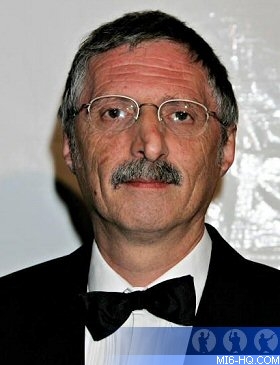
Above: Screenwriter Jeffrey Caine |
In those days it was seen as a progression;
now, I’m
not so sure – the best dramatic work on screen these days
(especially in the U.S.) is on the small screen. Compare The
Sopranos or The West Wing with Pirates of the Caribbean.
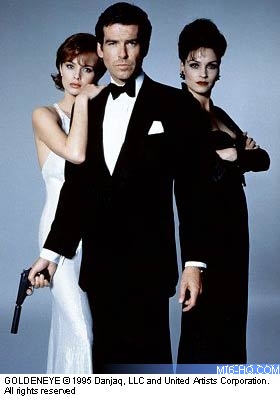 |
|
How did you get offered the "GoldenEye" job
and what specifically about James Bond attracted you
to the project?
I’d previously written two scripts for Barbara
Broccoli: an original and an adaptation. She liked my work.
What attracted me to the project was that it was not only
a “go” movie but also a chance to become involved
with an iconic franchise and so become a small part of film
history.
Is it correct that you took over an early draft from
Michael France for "GoldenEye"?
Yes. I was given France’s script and asked to
keep the premise but rewrite the rest substantially.
Was Pierce Brosnan officially onboard as 007 when
you took on the job?
The producers were considering Pierce among others
but had no Bond firmly in mind when I was hired. Before
writing the screenplay I pitched the story to Pierce (among
others). He was attached by the time I started to write.
|
France's draft was based around Dalton's portrayal. What
adjustments did you make to account for the new leading man?
None
really. I wrote Bond as I saw him. In fact the grittier, darker
Bond they have now in Daniel Craig was a Bond we considered
then, and rejected.
Were there any significant elements from the previous draft
that were dropped when you reworked the script?
Everything, pretty
much, except the Goldeneye weapon and its theft. Many of the
traditional Bond elements were missing
and had to be put in.
What key aspects of your Goldeneye
screenplay can we see on screen?
The screenplay speaks largely with my “voice”,
though one or two things I was fond of disappeared during
filming. Martin Campbell removed, without consulting me,
one scene that I think would have been an archetypal Bondian
moment.
How long did you work on the project?
Three weeks’ story preparation in L.A., a further
two or three in London; then a couple of months on the
two drafts before I was replaced.
Did you collaborate with anyone on the "GoldenEye" project?
Did Kevin Wade come on after you had completed your work?
Writers don’t collaborate on films unless they’re
a writing partnership. You write, you’re replaced
at the studio’s whim like last year’s shoes,
you have no contact with whoever succeeds you. Yes, I think
Kevin was the shoe they tried on next.
What is your fondest memory from working on the James
Bond series?
The story meetings, which my late wife attended and to
which she contributed. |
|
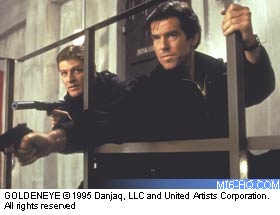
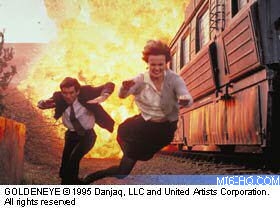
|
What are your views on the modern Bond films and how well,
do you feel, these movies echo what past screenwriters have
established? What did you think of Casino Royale?
Nothing survives unless it can change. I think the Bond movies
took a wrong turn in the ‘eighties, becoming too comic-book
in tone with Roger Mooore and then too austere with Tim Dalton.
I believe Goldeneye helped redress the balance in 1995 and Casino
Royale has given the franchise new life again. The principle governing
Hollywood sequels is: “Keep making them until they fail”.
The Bond producers are smarter. Their principle is: “Change
the formula as often as necessary to keep the product fresh.”
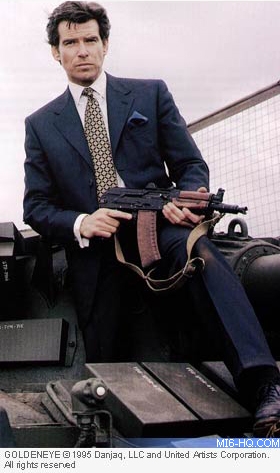 |
|
Once films are in production,
how much involvement do you have with the execution of
your work?
Usually very little. Directors don’t generally welcome screenwriters
on the set. We’re an inhibiting presence. Goldeneye was a special case:
I didn’t even visit that set. My wife was ill and I couldn’t leave
her.
How did you come to work on the Constant Gardner,
how long and difficult a story was it to adapt?
I had the good luck of knowing someone involved. In
this case, the producer’s script editor, whom I’d
worked with years before. She put me on the short list.
It wasn’t an easy adaptation, but they’re the
best kind: a professional challenge, room to add my own
voice. As a screenwriter do you sometimes feel apprehension
when handing over a particular script to a director?
Almost always. Some directors are more respectful
than others, some know more than others. I recently wrote
a screenplay for Lord Attenborough, who is demanding but
worth the trouble. He knows what he’s doing and he
respects the writer. Ditto Mike Newell.
|
Given the right incentives, would you ever consider returning
to write a Bond film?
My idea of “the right incentives” probably wouldn’t
conform to the producers’.
What project over your career are you most proud of?
I suppose
I’d have to say The Constant Gardener, since
that’s the one that has brought most acclaim. But, like
many screenwriters, I’ve written better scripts than the
ones that have been produced.
Aside from the obvious, what if any difference is there between
writing for television and big-screen and which is more rewarding?
Budget.
In a film you rarely have to ask yourself: “Can
they afford this scene?”. In American television, where
I haven’t worked, the writer is apparently more powerful
than he/she is anywhere else; which means your work retains much
of its integrity. That day hasn’t arrived in film and probably
never will.
What are you currently working on?
Several things. A historical
semi-epic, a gangster movie, an historical-political piece. I’ll
be lucky if one of them is produced.
Related Articles
 GoldenEye
- The Road To Production
GoldenEye
- The Road To Production
 GoldenEye
- Movie Coverage
GoldenEye
- Movie Coverage
Many thanks to Jeffrey Caine.